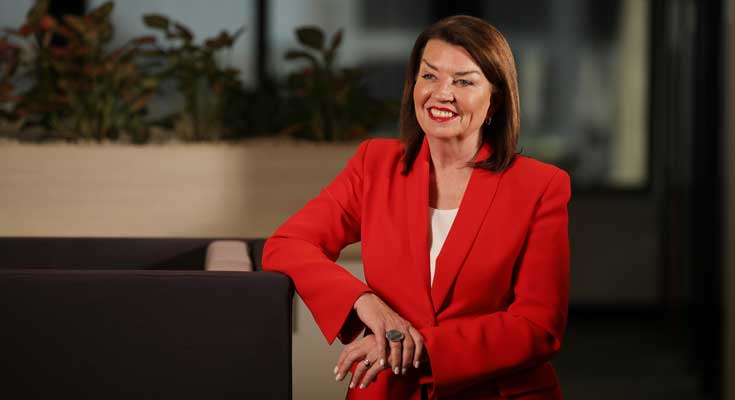Banks have a range of options to help customers impacted by COVID-19
30 October 2020
TRANSCRIPT: ABA CEO Anna Bligh spoke with ABC Sydney Radio’s Drive program on Thursday 29 October.
Interviewed by Andy Park, she answered questions about the impact of COVID-19 on banks’ profits, how banks have responded to help customers during the pandemic and what’s happening next to customers who’ve deferred their mortgages.

Andy Park: Anna Bligh joins me from the Australian Banking Association. G’day Anna.
Anna Bligh: Good afternoon, how are you Andy?
Andy Park: Good, good. Well, I suppose shareholders must have seen this coming with ANZ, have we, have we ever seen a profit plunge with one of the big four as dramatic as this in Australia’s history.
Anna Bligh: Oh look I can’t tell you the whole history but I think everybody knew at the beginning of COVID, that there was probably not going to be any industry that was left untouched by the sort of savage economic damage and banks did what I think the community had a right to expect them to do, and that is use their financial firepower to help households and small businesses get through it and yes, that’s had an impact on their bottom line. The challenge for every industry, including banks now over the next 12 months to two years is to rebuild.
Andy Park: I mean, I suppose there’s been some rumbling in shareholder groups about the deferrals, I mean how much pressure have they applied to the big four to get some of these mortgages back on track?
Anna Bligh: Well it’s in the interest of every Australian that banks do whatever they can to help those people who had to defer their mortgages or their small business loans, and help them get back on track as quickly as they can and you are right in your introduction that, as of early October, some 45% of those people who deferred have now moved back into full payments, and that’s in their best interest, the sooner they start paying their loan back, the better they’ll be financially, if they’re in a position to do so.
We’re still crunching the numbers for the rest of October, but we would fully anticipate that we will see that 45% number increase up over, maybe even up over 55% so that’s very encouraging. But there are going to be people for whom the six month deferral was not long enough because of their circumstances and some people may be eligible for a further extension of that deferral up to four months.
In many other cases, banks are now working with customers to restructure their loan so that they can make some payments so banks have quite a few tools in the toolkit, they can extend the length of your loan, they can move you to interest only payments for a period of time, they can reduce the interest rate, all of those things together can often mean that the customer can get back into payments and as I said that’s in their long term best interest to protect the equity they have in probably you know the biggest asset they will ever own.
Andy Park: When you said that half are back on track and making payments now, no doubt those are the mortgagees whose economic situation is improving most quickly but the remainder, that other half, they are going to be the more troublesome in terms of getting them back on track. I mean, you’ve got your work cut out for you in terms of tackling those more tricky cases, really.
Anna Bligh: It isn’t going to be easy for some customers. I should say the six month deferral started from the point that the customer took the deferral so this is a rolling process now until March next year, people could take the deferral right up until September. So if you deferred your mortgage in May or June, your six months is not over yet. So that accounts for some of that other half and at peak there were 900,000 loans deferred small businesses, mortgages, and personal loans and credit cards about 550 of those were mortgages and I would expect that we will see more and more people as their six month extended, their six month period comes to an end, they will be able to make payments and they will want to.
Australians want to own their home, they want to pay it off as quickly as they can but it could be as many as 10% of people in the end, who are not in a position to repay whether it’s their business loan or their mortgage.

Banks have got a lot of experience working with people in very difficult financial circumstances. You know, even long before COVID, people lost their jobs, people’s relationships broke up, people entered into some pretty tough financial difficulties. Banks have got very specialised teams that work with people, and they’ll be doing everything they can to get those customers back on track, or help them make some really tough decisions.
Andy Park: Do you have a picture of how many of those remaining 270 odd thousand mortgagees are in Victoria – no doubt hardest hit with the pandemic?
Anna Bligh: Banks have reported that there was a slight increase in the number of Victorians applying for deferrals for the first time in a second lockdown but overall, if you look at it across the country, the percentages per state are not that far out from their population ratio for the country so, but I think banks are very, very aware that small businesses in Victoria who have had a very difficult year, and where they haven’t had revenue now for a very extended period of time, are going to need a little longer to get back on their feet in a number of cases.
Andy Park: ANZ said today that quote, haven’t had a big issue with ghosting end quote. That’s customers not returning the bank’s calls or even perhaps hiding from the bank. Is that a concern with other banks?
Anna Bligh: Well, I think, I expect that ANZ were asked the question because some banks have reported that they’re having trouble with some customers and I expect it’s the minority of customers, not returning their calls or answering their correspondence and I don’t think that’s a surprise. I think talking about finances is, you know, it’s embarrassing, it’s difficult, it’s awkward and for people who have, perhaps experiencing this for the first time, it’s not surprising that you know they will say ‘I will get to that tomorrow, I’ll get to that tomorrow’.
And certainly the message we have is, the sooner you talk to your bank, the more likely it is that they’ll be able to help you through it. If you wait till you know you’re in over your head, it just gets much harder for anyone to fix the problem.
Andy Park: Anna Bligh is my guest. She’s from the Australian Banking Association. As we talked about the hundreds of thousands of Australians deferring their mortgages. Moody’s anticipates the expiry of the job keeper payments and other bank support programs, you know, in March next year 2021, to drive an increase in non performing loans, how are the banks preparing for what’s ahead in March next year, will we face a cliff?

Anna Bligh: Well, as I said, there’s you know 900,000 people at the beginning of all of this, that deferred their loans, that’s the single biggest out reach to customers that banks have collectively done, I think, ever in their history. Most banks have doubled the size of their customer assist team just so that they could do this and they know, customers are telling them that some one person in the mortgage with a second income has lost their job and they’re on JobSeeker, or they’re on JobKeeper and you can see what’s happening to that person’s income, what potentially might happen as JobKeeper and JobSeeker get gradually cut back but the person might also get another job in that time, so these are very individualised circumstances.
They’ve got very bespoke solutions for each customer and banks are working to make sure that they can find the right solution for every one of those people. But you’re right, household income has been supplemented by the government to get us all through this. As that household income supplement cuts back, I expect that we will see some customers in more difficulty than they’ve experienced in the past.
Andy Park: It’s a rocky road ahead, and lastly, you know, we pretty much don’t have a premier on the east coast of this country, not under pressure right now and you know what it’s like to handle a crisis with your time as Queensland premier during those floods. I mean, what perspectives would you offer on the premiers and their leadership this year?
Anna Bligh: Oh well, I think most Australians would, like me, not envy any of our political leaders at the moment. They’ve faced unprecedented circumstances, the country’s you know, more than a century since we’ve gone through anything like this, and I think this one is vastly different to the circumstances of the Spanish flu. You know, I take my hat off to the political leadership of Australia on all sides, it’s been a very tough year. No one’s perfect, of course some mistakes might have been made here and there but overall, I think we can hold our head up very high on the international stage.
Andy Park: Yeah, well, obviously we’re not out of the woods yet, in March next year will be a key date as we go towards that all important JobKeeper end deadline, Anna Bligh thanks so much for joining us.
Anna Bligh: Thanks a lot.
Latest news
Michael McLaren (Host): Well, here we are at the Easter Show, the great celebration of country life in the city, but it’s also an important platform this to better understand the challenges that the regions face. Now, yesterday, we looked at the floods. Today, I want to look at the banks. Now in the regions,… Read more »
The ABA is reminding customers across North and Far North Queensland that they don’t have to tough it out on their own, as they continue to recover from February’s severe flooding event. ABA CEO Anna Bligh recently met with Queensland’s State Recovery Coordinator Andrew Cripps to discuss how banks can assist customers facing financial difficulty… Read more »
Banks stand ready to support customers in western Queensland and parts of New South Wales affected by heavy rainfall and flooding. ABA CEO Anna Bligh said customers don’t have to tough it out on their own and banks have a range of practical measures to assist those facing financial stress. “This is a challenging time… Read more »
